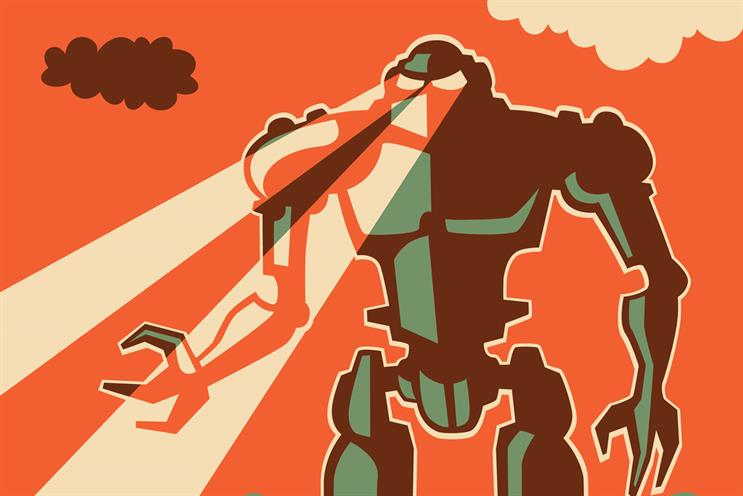There’s a growing sense of unease in adland that, when it comes to getting machines involved, anything you can do, AI can do better.
The machines have access to more customer data than humans can process. They can analyse it faster than humans can and in many cases can make supremely reasoned and effective choices when it comes to marketing strategy.
Punning aside, the concerns that computers beat humans are genuine even if the threat that the machines are about to take over is a little, OK, a lot, overstated.
The fact is that the pace of technology is mind-blowing. In marketing services alone, we have barely scratched the surface of what new software and programmes can do for us today let alone what it might be able to do in the future.
Google’s Deepmind and IBM’s Watson artificial intelligence propositions continue to demonstrate their intellectual superiority.
There are tasks that can be purely achieved by machine and if an individual’s role is entirely made up of repeatable tasks then there’s no dodging it. Some humans are replaceable.
Watson is enjoying fame on the game show circuit, beating contestants at US-based quiz show, Jeopardy. Deepmind is stunning players of the ancient Chinese game of strategy literally out of their seats. It has been said that AlphaGO played a move so devious and unforeseen that the current world champion had to stand up mid-game, go away and reflect on what had just happened. And then he still lost.
But we must use the word "intellectual" with caution. Various definitions of that word come up with "the faculty of reasoning and understanding objectively, especially with regard to abstract matters" or "the power or faculty of the mind by which one knows or understands".
What Deepmind and Watson show isn’t intellectual superiority, it is analytical capability. And it is that capability that both expands and limits technology’s usefulness in the creative arts.
Anything that requires regularity and rigour, anything that can follow rules and root out problems is a prime target for AI. This is an area where the machines absolutely should take over.
Creating stronger formulas to guide creative work is an area where supplementing the human is desirable. AI can help make assumptions and formulae that guide standard brand work making it more robust and giving valuable insight into what messages and channels are most effective.
It’s in pure, original creativity that humans will be safe for some time to come. At its best, totally unique ideas seem to come from nowhere. But it does come somewhere - creative, free-thinking, experienced and talented individuals.
The fear of machines is not entirely misplaced but the reasons are two-fold. First, we aren’t entirely comfortable with admitting that a lot of work produced every day for clients is pretty formulaic stuff, even if big brands have used this formulaic stuff to great effect in the past.
But secondly that it will make some people’s skills today redundant. There are tasks that can be purely achieved by machine and if an individual’s role is entirely made up of repeatable tasks then there’s no dodging it. Some humans are replaceable.
Which is why we need to invest in our human capital. We shouldn’t be thinking about why we are wasting money getting slow humans to complete tasks the machines can accomplish twice as fast for half the cost.
Instead, we should be thinking about developing those humans to do jobs machines could only do half as well and for twice the cost.
In the creative industries we like to think of ourselves as the original problem-solvers, the innovative, out-of-the-box thinkers. Always pioneers of the new and the disruptive.
But it’s taking examples from sectors we tend to think of as set in their ways, traditional and slow-moving to show how we need to respond not to the threat of AI, but the opportunity.
Aviva, one of the UK’s largest insurers, invited its 16,000 employees to voice their concerns if they thought their role could be mostly or wholly taken over by a robot.
Even though the likelihood of this happening was in no way imminent, the company offered to retrain anyone who felt this was likely. Their idea, it was said, was "to remove the robot from the person, not replace the person with robots".
So too adland should be freeing up its people from their inner robot. This is about giving humans the space to broaden that intellect. To allow the abstract to take hold and foster those "out of nowhere" ideas.
Because those award-winning, ground-breaking ideas don’t come from nowhere, they come from minds given the space to build creativity, not just process it.
Jon Goulding is a founding partner of Atomic London


